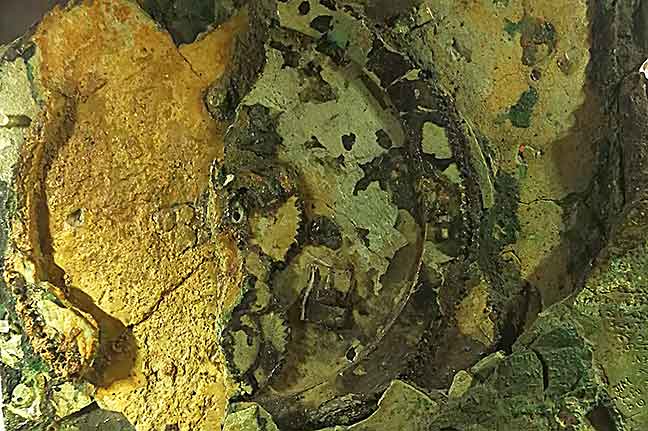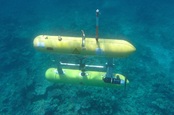I couldn't give a Greek clock about your IoT fertility tracker
Pop this in your mouth and say 'Rastapopoulos'

Something for the Weekend, Sir? Like to get wet, confides (or asks) the manufacturer in suitably moist English.
Faithful admirers of my long-standing column will immediately recognise a sexual double-entendre when they read one. But this time you'd be wrong. Or at least you might be. I'm not sure.
I am looking at Comper Healthcare's promotional web pages for its – I kid you not – tongue-activated Fertility Tracker, hence nifty headings such as Like to get wet. The site's awkward phrasing means you are left to guess whether the sexual allusions are accidental or intentional.
For example, I am curious as to the thinking behind Brings you trully (sic) natural feeling in mouth – a new interpretation of the word "natural" given that a flat clump of plastic-encased electronics is possibly one of the least likely things you were intending to shove into your gob today.
Pretending the naughty catchlines are accidental makes it more amusing. My favourites include Fast but accurate (ah, my reputation precedes me), Innovative disinfection (eww) and the suggestive simplicity of Catch the rise.
Call it the last word in intrusive wearable IoT, call it an app-enabled medical device, call it a trumped-up thermometer (surely not), Comper Fertility Tracker is designed to help a woman track her body temperature over time. Or in other words, to find out when she's – quite literally – on heat.
That's what Catch the rise refers to: the rise in body temperature. At least, I think so, although I suppose one thing leads to another.
It's easy to mock mangled use of English but no one mangles it better than a native speaker. Shakespeare did it skilfully; the rest of us do it on a sliding scale of ineptitude. I call your attention to the various tech-influenced expressions that get added to reputable dictionaries each year: the beginning of 2018, for example, witnessed the Oxford English Dictionary making room for likes of e-ink, self-checkout and mansplain.
These work just fine but they encourage the rest of us to have a go at inventing new words and we cock it up. Take glamping. It means going on a camping trip with a massive tent, lots of furniture, a comfy bed and a fully stocked fridge. It works as a new word because it's a contraction of glamorous camping. It sounds more fun than real camping – i.e. mud, earwigs and a half-mile hike to the nearest shitter – and cheerfully gayer to boot.
What this does, however, is lead to a steaming pile of copycats that don't work. Recently my attention was drawn to gloating. Apparently, this means taking a riverside holiday in a posh narrowboat or luxury yacht, being a contraction of glamorous boating. Obviously it fails in its aspirations to be freshly made-up word because gloating already has a pre-existing meaning: it means 'gloating'.
You may infer from my pre-occupation with such
inconsequential nonsense that I found myself easily distracted this
week. Squirrelled away in the deepest, darkest depths of inadequately
lit hotel conference rooms, I sat through three days of back-to-back
meetings alongside 100 fellow conflicted unfortunates from various
fields of technology.
Conflicted? Well, the hotel in question was the Athens Hilton. That's still a lot of meetings to endure despite the luxurious environment – you might call it gleeting I suppose – so it's inevitable that the mind wanders.
So too do the feet. Noting the sudden availability of 60 glorious meeting-free minutes in the middle of one afternoon (marked down as Networking Over Coffee in the event schedule), a colleague suggested we grab a taxi to the National Archaeological Museum instead and go see the Antikythera Mechanism.
Recovered by Greek sponge divers in 1900 along with lots of statues and pots from a Roman shipwreck from around 100 BC, the Antikythera Mechanism is a collection of broken artefacts that appear to have been components of an intricate clock-like device. X-rays have revealed a complex set of finely toothed, interlocking bronze gearwheels whose precision metalworkers had the forethought to detail with etched labels so that we have a fairly good idea what it was for: it makes calculations based on cycles of the Solar System to predict lunar eclipses, even accounting for the elliptical nature of the lunar orbit.
Nor is this a flight of fancy for archaeological researchers, since the silt in which the Mechanism ended up buried two thousand years ago preserved parts of its wooden case on which was written – get this – instructions on how to use it. Just imagine, a user manual supplied with the product itself! Incredible!
Here's one of the cogs. The museum's seven-minute documentary, complete with animated 3D reconstructions, can be viewed on YouTube.

The Antikythera Mechanism really ought to be on display in a pantheon of scientific discovery, preferably on velvet cushions in gilt cases and surrounded by lyre-strumming angels, rather than rubbing shoulders with dusty Egyptian sarcophagi and broken crockery, but what do I know?
As I danced around the museum cabinets like an excited child, taking hundreds of photos like the one above with my smartphone, I accidentally barged into another museum visitor in my exuberance. I was halfway through blurting out an apology before realising that I had seen the fellow's face before. It was one of the conference delegates.
Looking around, I noticed that everyone else in the room seemed quite familiar too. It turned out we had all bunked off from the Networking Over Coffee that was possibly still taking place on the other side of town. I say "possibly" because most of us were here thrilling over the Antikythera Mechanism instead. It was like being in a room full of mischievous school truants, except without the snapped shoelaces and glue.
In the corner of the room, sporting a sheepish grin, was the VP who'd invited me to Athens in the first place. He'd chosen to play hooky from his own conference.
So, if you've ever been tempted to bunk off from a professional congress held in a five-star hotel, now you know it has a name.
It's called glunking.
Faithful admirers of my long-standing column will immediately recognise a sexual double-entendre when they read one. But this time you'd be wrong. Or at least you might be. I'm not sure.
I am looking at Comper Healthcare's promotional web pages for its – I kid you not – tongue-activated Fertility Tracker, hence nifty headings such as Like to get wet. The site's awkward phrasing means you are left to guess whether the sexual allusions are accidental or intentional.
For example, I am curious as to the thinking behind Brings you trully (sic) natural feeling in mouth – a new interpretation of the word "natural" given that a flat clump of plastic-encased electronics is possibly one of the least likely things you were intending to shove into your gob today.
Pretending the naughty catchlines are accidental makes it more amusing. My favourites include Fast but accurate (ah, my reputation precedes me), Innovative disinfection (eww) and the suggestive simplicity of Catch the rise.
Call it the last word in intrusive wearable IoT, call it an app-enabled medical device, call it a trumped-up thermometer (surely not), Comper Fertility Tracker is designed to help a woman track her body temperature over time. Or in other words, to find out when she's – quite literally – on heat.
That's what Catch the rise refers to: the rise in body temperature. At least, I think so, although I suppose one thing leads to another.
It's easy to mock mangled use of English but no one mangles it better than a native speaker. Shakespeare did it skilfully; the rest of us do it on a sliding scale of ineptitude. I call your attention to the various tech-influenced expressions that get added to reputable dictionaries each year: the beginning of 2018, for example, witnessed the Oxford English Dictionary making room for likes of e-ink, self-checkout and mansplain.
These work just fine but they encourage the rest of us to have a go at inventing new words and we cock it up. Take glamping. It means going on a camping trip with a massive tent, lots of furniture, a comfy bed and a fully stocked fridge. It works as a new word because it's a contraction of glamorous camping. It sounds more fun than real camping – i.e. mud, earwigs and a half-mile hike to the nearest shitter – and cheerfully gayer to boot.
What this does, however, is lead to a steaming pile of copycats that don't work. Recently my attention was drawn to gloating. Apparently, this means taking a riverside holiday in a posh narrowboat or luxury yacht, being a contraction of glamorous boating. Obviously it fails in its aspirations to be freshly made-up word because gloating already has a pre-existing meaning: it means 'gloating'.
Conflicted? Well, the hotel in question was the Athens Hilton. That's still a lot of meetings to endure despite the luxurious environment – you might call it gleeting I suppose – so it's inevitable that the mind wanders.
So too do the feet. Noting the sudden availability of 60 glorious meeting-free minutes in the middle of one afternoon (marked down as Networking Over Coffee in the event schedule), a colleague suggested we grab a taxi to the National Archaeological Museum instead and go see the Antikythera Mechanism.
Recovered by Greek sponge divers in 1900 along with lots of statues and pots from a Roman shipwreck from around 100 BC, the Antikythera Mechanism is a collection of broken artefacts that appear to have been components of an intricate clock-like device. X-rays have revealed a complex set of finely toothed, interlocking bronze gearwheels whose precision metalworkers had the forethought to detail with etched labels so that we have a fairly good idea what it was for: it makes calculations based on cycles of the Solar System to predict lunar eclipses, even accounting for the elliptical nature of the lunar orbit.
Nor is this a flight of fancy for archaeological researchers, since the silt in which the Mechanism ended up buried two thousand years ago preserved parts of its wooden case on which was written – get this – instructions on how to use it. Just imagine, a user manual supplied with the product itself! Incredible!
Here's one of the cogs. The museum's seven-minute documentary, complete with animated 3D reconstructions, can be viewed on YouTube.

The Antikythera Mechanism really ought to be on display in a pantheon of scientific discovery, preferably on velvet cushions in gilt cases and surrounded by lyre-strumming angels, rather than rubbing shoulders with dusty Egyptian sarcophagi and broken crockery, but what do I know?
As I danced around the museum cabinets like an excited child, taking hundreds of photos like the one above with my smartphone, I accidentally barged into another museum visitor in my exuberance. I was halfway through blurting out an apology before realising that I had seen the fellow's face before. It was one of the conference delegates.
Looking around, I noticed that everyone else in the room seemed quite familiar too. It turned out we had all bunked off from the Networking Over Coffee that was possibly still taking place on the other side of town. I say "possibly" because most of us were here thrilling over the Antikythera Mechanism instead. It was like being in a room full of mischievous school truants, except without the snapped shoelaces and glue.
In the corner of the room, sporting a sheepish grin, was the VP who'd invited me to Athens in the first place. He'd chosen to play hooky from his own conference.
So, if you've ever been tempted to bunk off from a professional congress held in a five-star hotel, now you know it has a name.
It's called glunking.

Comments